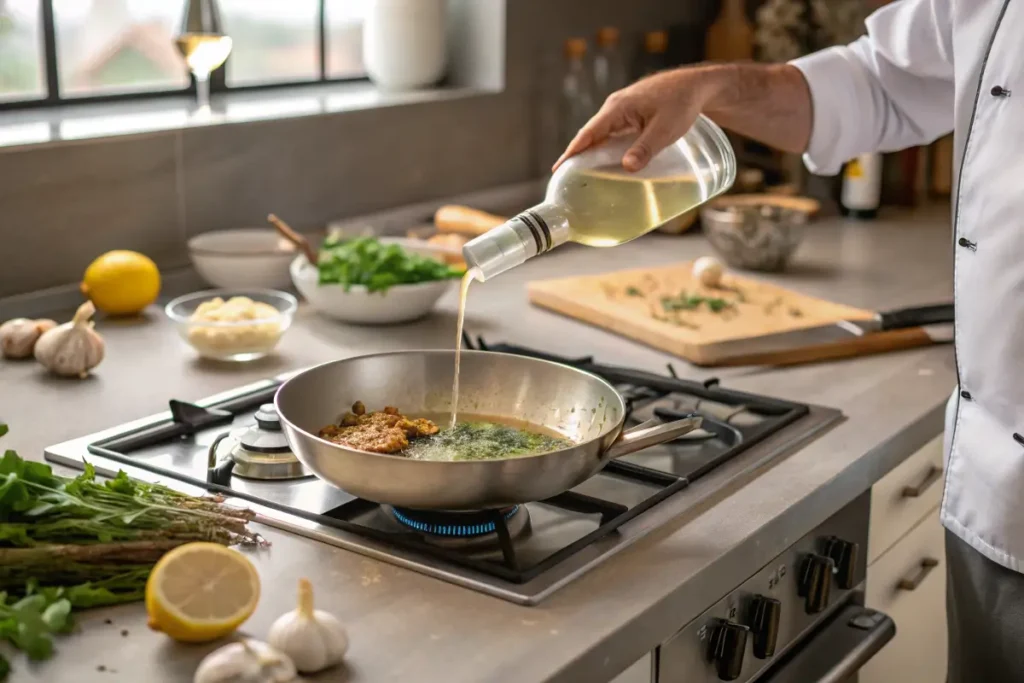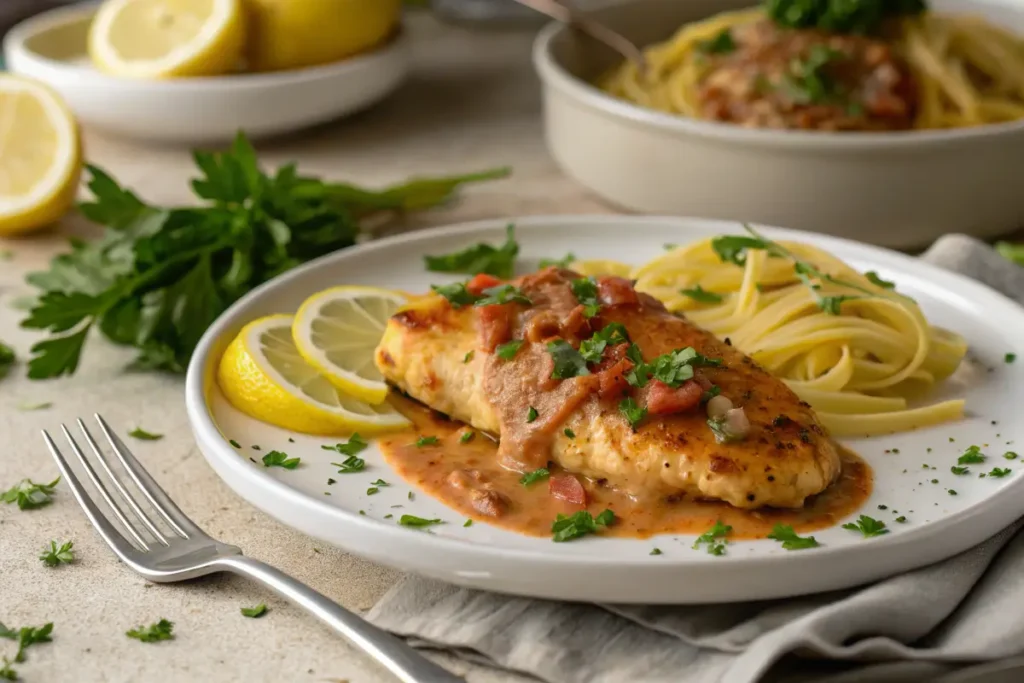Have you ever taken that first bite of chicken piccata and thought, “Hmm, something’s off?” If you’ve been asking yourself Why is my chicken piccata bitter? you’re not alone. While this classic Italian-American dish is cherished for its tangy sauce and bright citrus notes, it can occasionally lean toward an unpleasant bitterness. In this comprehensive guide, we’ll uncover common pitfalls, explain how to avoid them, and reveal secrets to creating a smooth sauce consistency every time. Stick around to learn all about choosing the right ingredients, balancing flavors, and elevating this meal with plenty of flair.
Understanding Chicken Piccata
What Makes Chicken Piccata Unique
Chicken piccata stands out because of its delightful combination of pan-seared meat, vibrant lemon juice, and velvety pan sauce. The dish’s hallmark tangy sauce is what gives it that classic zing, yet it can sometimes lead to a bitter bite if key steps aren’t followed. At its core, chicken piccata is all about highlighting the interplay between tart, savory, and lightly sweet flavors. By taking special care with the lemon zest vs. lemon pith and understanding proper lemon extraction, cooks can prevent the dish from becoming overly acidic.
Moreover, chicken piccata’s name comes from the Italian word “piccato,” meaning “larded,” which references the technique of sautéing meat in a hot pan. This method allows pan drippings—often called fond—to develop, adding a rich flavor base. Deglazing that fond with wine or stock ensures vibrancy while helping to prevent dryness in each bite.
Traditional Ingredients & Flavor Profile
Traditionally, chicken piccata includes a few simple building blocks: chicken breast, flour for dredging, butter, olive oil, lemon juice, and capers. Salt and pepper are standard, though other herbs and seasoning variations can be layered in. Some cooks choose wine for deglazing, while others prefer chicken stock—or even both—for extra depth. When done right, the sauce strikes an irresistible harmony of bright citrus, savory elements, and a gentle tartness in sauce that leaves you wanting more. If bitterness lingers, it may be due to overstepping these delicate flavor boundaries, which we’ll explore in more detail next.
Why Is My Chicken Piccata Bitter? Common Culprits
Over-Extracted Lemon Zest or Pith
If you’ve wondered Why is my chicken piccata bitter? one prime suspect is the misuse of lemons. Many cooks view zest as a quick way to add tangy flavor, yet they sometimes overdo it. Lemon zest can be intense, especially if traces of pith sneak in. That spongy white layer lurking below the peel packs a punch that can produce strong acidic notes. Consequently, your sauce may veer from pleasantly tart to uncomfortably bitter.
Moreover, people often assume more zest equals more flavor. But, you should tread carefully. Too much peel, especially when combined with fresh lemon juice, amplifies tartness and leads to an unbalanced dish. By grating lightly and avoiding the bitter pith, you can achieve that citrusy zing without overwhelming your sauce. Another citrus bitterness remedy is to add a hint of sweetness—like sugar or honey—to reduce sharp flavors. This simple tweak helps maintain a smooth sauce consistency that underscores the bright notes in chicken piccata.
Cooking Techniques That Intensify Bitterness
Sometimes, it’s not just the lemons that cause trouble. Certain cooking habits can also explain Why is my chicken piccata bitter? For instance, overcooking garlic or onions can produce harsh undertones that seep into your pan sauce. Additionally, using stale or low-quality olive oil introduces unwanted pungency, especially at high temperatures. And when you deglaze the pan with wine, watch out for cooking wine acidity. If your wine is too acidic, it can escalate any existing bitterness.
Furthermore, skipping or rushing the deglazing step can burn bits of pan drippings (fond), creating a charred aftertaste. To avoid that problem, deglaze gently while stirring. Then, let the liquid reduce. Balancing herbs and seasoning is crucial, too. Overdoing strong flavors like oregano can clash with lemon. Instead, opt for subtle herbs such as parsley or basil to keep the dish fresh and tangy without turning bitter.
Bitter Chicken Piccata — The Role of Lemons & Acidity
How Acidity Affects Taste
Acidity is at the heart of chicken piccata, yet too much of it leads to an unpleasant sting. Lemons are the main source of that piquant overtone, delivering bright flavor that makes this dish memorable. But balance is key. While trying to answer Why is my chicken piccata bitter?, you might look at how acidity interacts with other elements. Indeed, when lemon juice, wine, or even capers ramp up those acidic notes, they can overshadow the mild, savory essence of the chicken.
Moreover, certain ingredients heighten the tanginess. White wine that’s too astringent or vinegar with a high acid content can push your sauce off-kilter. Over-reducing these liquids multiplies the sour punch, transforming a tangy sauce into a bitter brew. Likewise, if you add extra lemon juice at the end, you might tip the scale into a territory that’s far from palate-pleasing. Hence, it’s wise to taste test along the way, so you spot danger signals early.
Balancing Acidic Ingredients for a Mild Tang
Luckily, there are stress-free fixes to stop an acidic overload. Blending in a pat of butter or a splash of cream can soften harsh flavors. This creamy vs. buttery sauce adjustment technique introduces a velvety texture and mellows any clashing lemon or wine. You may also whisk in a small roux or slurry to thicken the sauce, which can help bind flavors and reduce bitterness.
Additionally, a pinch of sugar—or sweetener of your choice—performs wonders at balancing bitterness. Honey, agave, or even a bit of maple syrup will cut through the sourness without making the dish taste sugary. Another effective trick is to add a dash more chicken stock, as it rounds out the tang. By embracing these methods, you can maintain the tartness in sauce that defines chicken piccata while ensuring it never crosses into that unappealing bitter zone.
Culinary Techniques to Counteract a Bitter Chicken Piccata

Proper Deglazing Methods
When the dreaded question Why is my chicken piccata bitter? pops into your mind, remember that proper deglazing can make all the difference. After sautéing your chicken and aromatics, you’ll often see browned bits—known as fond—clinging to the pan. Rather than letting these pieces burn, pour in a splash of wine or stock to loosen them. Stir gently while scraping the bottom, ensuring those savory morsels dissolve into your sauce. Thus, you capture all that rich flavor base without allowing anything to scorch and release bitter compounds.
Furthermore, be mindful of the heat. If the pan is too hot, the deglazing liquid can evaporate in seconds, leaving you with sticky residue that might burn. Lowering the temperature before adding your liquid promotes a smooth sauce consistency and enough time for the fond to meld into the sauce. Meanwhile, keep tasting as you go. If your mixture seems overly acidic, add a small dab of butter or a touch of cream to counterbalance the sharpness.
Enhancing the Sauce With Sweetness & Fats
Yet another method to handle bitterness involves subtly reducing sharp flavors with natural sweetness. For instance, toss in a pinch of sugar, a drizzle of honey, or even a teaspoon of agave. Although it may sound odd, this gentle sweetener trick can mitigate harsh notes. At the same time, it helps showcase the tartness in sauce that defines chicken piccata.
Additionally, think about fats. Butter often makes an appearance in final preparations because it enriches the sauce and tones down edgy bites. In similar fashion, a splash of cream or half-and-half can bring a velvety texture. As you stir in these elements, they unite your flavors, reduce unwanted tang, and give you a balanced sauce that still highlights the lemon zest vs. lemon pith freshness.
Ingredient Quality & Selection to Prevent Bitterness
Picking Fresh & High-Quality Lemons
When puzzling over Why is my chicken piccata bitter?, you can frequently pinpoint the lemons themselves as a root cause. Fresh, vibrant lemons yield a bright taste, whereas stale or overly firm lemons can taste dull or bitter. Consequently, it’s wise to choose lemons that feel slightly soft to the touch, yet not squishy. If they have a strong, clean citrus aroma, it’s a good sign they’re bursting with juice and free from metallic or off flavors.
Moreover, always be watchful of the rind. If your lemons have thick pith, you’ll need to zest them carefully. Remember that lemon zest vs. lemon pith difference can make or break your dish. Using a precise zester or microplane helps you obtain only the outer yellow portion, which holds that lovely tangy sauce essence. By avoiding the pithy white layer, you minimize bitterness and keep your sauce zesty.
Choosing the Right Wine or Stock
Even though lemons steal the spotlight, wine or stock plays a major role in the final taste. If your chosen wine is too acidic or of poor quality, you risk introducing sour undertones. Opt for a mild white wine with subtle flavors. Alternatively, a good chicken stock can impart a rich flavor base without heightening acidity. In either case, keep an eye on cooking wine acidity. Steer clear of cooking wines loaded with salt or preservatives, since they often amplify bitter sensations.
On top of that, consider the salt levels in your stock. If it’s too salty, you might be forced to add more water, which can shift the sauce balance and lead to unpleasant flavors. By selecting fresh lemons, high-quality wine, or a well-crafted stock, you’ll set the stage for a perfectly balanced chicken piccata—one that stays bright and tangy without tipping toward bitterness.
Step-by-Step Solutions to Fix a Bitter Chicken Piccata
Techniques to Reduce Bitterness Mid-Cooking
If you suddenly realize your sauce tastes off, don’t panic. Begin by lowering the heat, then add a splash of chicken stock or water to dilute the bitterness. Stir gently so it melds well with the existing sauce. Next, slip in a small amount of butter or even a swirl of cream. These fats help smooth out harsh flavors and create a velvety texture. You may also try sweetening the sauce with a teaspoon of sugar or honey. By introducing sweetness gradually, you won’t overwhelm the tangy sauce character.
Furthermore, test for overcooked garlic or onions. If they’ve turned dark, scoop them out to avoid a lingering bitter backbone. Likewise, watch for scorched pan drippings. When you properly deglaze the pan, you capture the essential fond without burning it. Whenever the question Why is my chicken piccata bitter? arises, these small tweaks usually correct flavor missteps.
Adjusting Seasonings for Perfect Balance

Once you’ve tamed the bitterness, finalize the seasoning with salt, pepper, and herbs like parsley. Parsley brightens the dish without adding unwanted edge. If needed, adjust lemon juice in tiny increments. Taste as you go. Through this careful approach, you ensure the acidic notes enhance rather than overpower your meal.
FAqs
How Do I Fix Overly Bitter Chicken Piccata?
Reduce unwanted tang by adding a hint of butter or cream. This step mellows out sharp edges while preserving that rich flavor base. Another quick solution is a dash of sugar or honey. Stir thoroughly and taste again. If the sauce stays bitter, add a splash of mild stock to balance the tartness in sauce.
Can I Replace Lemons With Another Citrus?
Absolutely! You can swap in lime or even a little grapefruit. However, be cautious with grapefruit since it can bring extra bitterness. Always sample the sauce mid-cook to maintain harmony and prevent sharp flavors from taking over.
Why Does My Sauce Taste Metallic?
Occasionally, cheap cookware or over-stored lemons cause a metallic note. Likewise, an acidic wine might react with metal pans, producing off tastes. Switch to stainless steel or nonstick, and ensure fresh lemons to avoid that lingering question: Why is my chicken piccata bitter?
Conclusion
In the end, understanding Why is my chicken piccata bitter? can save your dish from disappointment and elevate your culinary skills. By focusing on fresh ingredients, mastering deglazing techniques, and balancing flavors with sweetness and fats, you can create a chicken piccata that delights the palate. Remember, cooking is a journey filled with learning opportunities. So, don’t hesitate to experiment with ingredients and flavors. With these tips in hand, you’ll soon serve up a delectable chicken piccata that shines with brightness and avoids any bitter notes. Happy cooking!
- Explore the differences between Chicken Marsala and Chicken Piccata to understand which dish suits your taste better. Learn more here.
- Discover the unique flavors of Chicken Piccata and how it compares to other classic dishes like Chicken Marsala. Read the full comparison.
- Find out why Chicken Piccata is a favorite among Italian cuisine lovers and how it stacks up against Chicken Marsala. Check it out here.
- Learn about the key ingredients in Chicken Piccata and how they differ from those in Chicken Marsala. Get the details.
- Uncover the cooking techniques that make Chicken Piccata unique compared to Chicken Marsala. Discover more.






